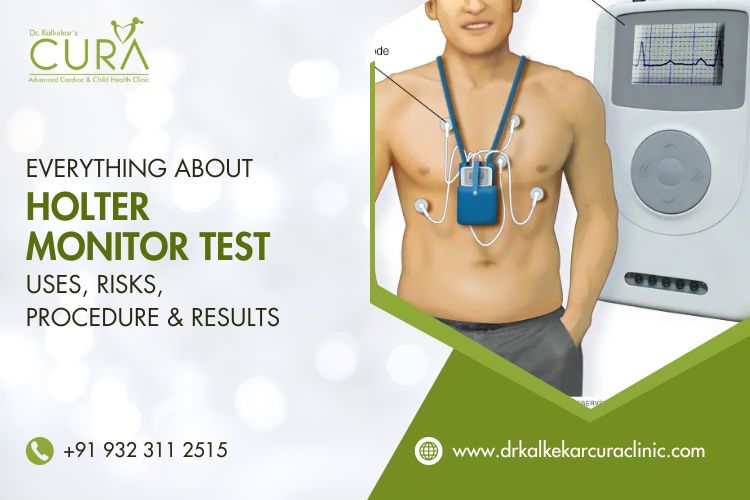All You Need to Know About the Holter Monitor Test – Uses, Risks, Procedure & Results
If you've ever had heart concerns and your doctor suggested a Holter monitor test, you might be wondering what exactly this test involves and how it can help. Well, you’re in the right place! The Holter monitor is one of the most common ways doctors track your heart’s electrical activity while you go about your day-to-day life. It’s an easy, non-invasive procedure that helps doctors get a clearer picture of what might be happening inside your heart—especially if you’ve been experiencing symptoms like dizziness or irregular heartbeats. Here’s the scoop on the Holter monitor: what it can detect, how it works, and what to expect during and after the test.
Interesting Fact: The device is named after Norman J. Holter, the physicist who invented it back in the 1950s!
What is a Holter Monitor?
A Holter monitor is a small, portable device that continuously records your heart’s electrical activity for an extended period, usually 24 to 48 hours. Think of it as a more thorough version of an ECG that you wear around your neck or on your waist during your normal activities. It’s typically used when a regular ECG doesn’t provide enough information or if your symptoms don’t show up when you’re in the doctor’s office.
Who Needs a Holter Monitor?
A Holter monitor test is ideal for people who may have symptoms of an irregular heart rhythm, like palpitations, dizziness, or unexplained fainting, but haven’t had these symptoms during a routine ECG. Some arrhythmias (irregular heart rhythms) are intermittent, popping up only occasionally or for short periods. The Holter monitor helps capture these elusive heart issues by tracking your heart’s behavior over a longer span while you go about your normal daily activities.
If your doctor has been unable to pinpoint the cause of your symptoms or if an ECG didn’t catch any abnormal heart rhythms, the Holter monitor might be the next step.
What Conditions Can a Holter Monitor Detect?
The Holter monitor can help diagnose a range of heart-related conditions, including:
- Arrhythmias: Irregular heartbeats
- Heart Palpitations: Abnormal sensations or pounding of the heart
- Cardiac Ischemia: Insufficient oxygen supply to the heart
- Unexplained Dizziness: That may be linked to heart function
It can also be used to check how effective heart medications are, how well a pacemaker is functioning, and monitor the oxygen supply to the heart.
Is the Holter Monitor Safe?
The Holter monitor test is safe and painless. The only possible discomfort you may experience is from the small adhesive electrodes attached to your chest, which might cause mild irritation. If you have sensitive skin or are allergic to adhesives, let your doctor know ahead of time.
How Does the Holter Monitor Test Work?
Prep:
Before the test, you’ll meet with a doctor who will attach small, round electrodes to your chest using adhesive. If needed, they may shave a small area to make sure the electrodes stick well.
Monitoring:
The device, which is small and lightweight, will be connected to the electrodes and can be worn in a pocket, purse, or attached to your waist with a strap. You’ll wear the monitor for 24 to 48 hours and go about your usual routine.
Instructions:
You’ll get guidance on how to take care of the device. It’s important to avoid getting it wet (so take a shower before the test!) and avoid things like X-rays, metal detectors, or areas with high voltage.
Returning the Device:
After 1-2 days, the doctor will remove the electrodes and send the device back for analysis.
What Should You Avoid While Wearing the Holter Monitor?
While you’re wearing the Holter monitor, there are a few things you should avoid:
- Bathing, Showering, or Swimming: The device is not waterproof.
- X-rays: It could interfere with the monitor’s function.
- High-voltage Areas: Stay clear of areas with strong electrical fields or metal detectors.
What Happens After the Test?
After the monitoring period, your cardiologist will review the data and contact you with the results within 1-2 weeks. The results could reveal a variety of heart rhythm irregularities, such as:
- Atrial Fibrillation (AFib): An irregular, often rapid heart rate.
- Bradycardia: Slow heart rate.
- Tachycardia: Fast heart rate.
- PVCs (Premature Ventricular Contractions): Early heartbeats that can cause palpitations.
Based on your results, your doctor will explain the findings and may recommend treatments like medication or further testing if necessary.
Conclusion
The Holter monitor is a fantastic tool for diagnosing heart issues that don’t always show up during a routine ECG. If your doctor suggests you wear one, it’s likely to help find the root cause of your symptoms, allowing for the best possible treatment plan moving forward. If you’ve been experiencing heart irregularities, at Dr. Kalkekar's Cura Clinic, we offer a Holter monitoring test in Seawood, providing you with a comprehensive assessment of your heart's activity over an extended period for accurate diagnosis and effective treatment.




